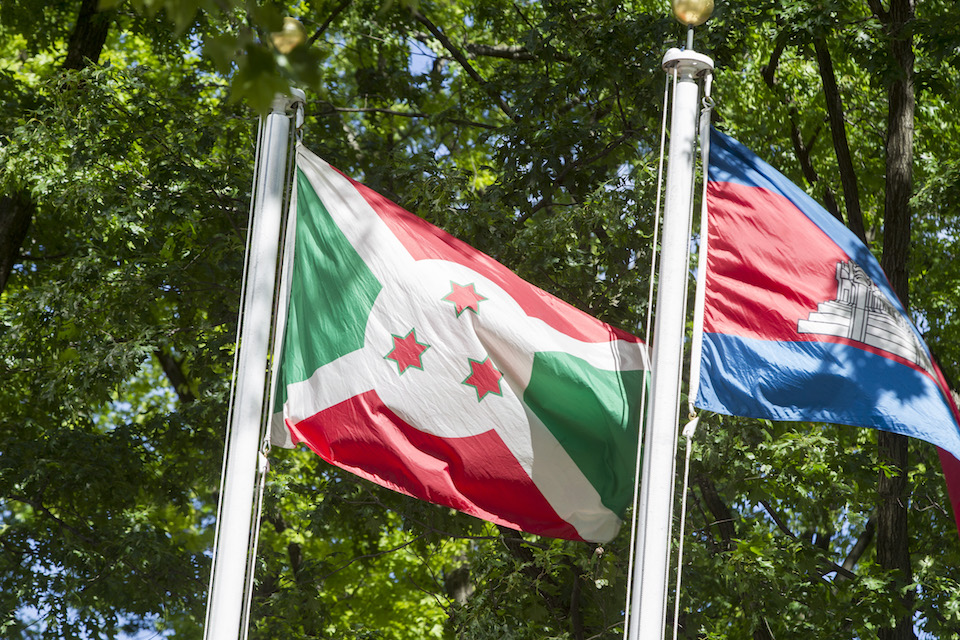Promoting peace, stability and security in the Central African region
Statement by David Clay, UK Political Coordinator at the UN, at the Security Council briefing on UNOCA

Thank you, Mr President.
We first want to express our condolences to the Government and the people of Burundi for the recent death of President Nkurunziza.
We’d like to express our appreciation for the work the Mission is undertaking across Central Africa to support and promote peace, stability and security in the region.
Although there has been progress in a number of areas, countries across Central Africa continue to face serious political and security challenges that could be exacerbated by COVID-19, as the SRSG has set out for us this morning. It remains vital that all countries continue to work together to mitigate the spread of the virus in ways that will strengthen rather than undermine peace and security and to ensure the protection of civilians. We should ensure that our response is built on the protection and promotion of human rights, inclusive and resilient economic recovery, as well as the maintenance of international peace and security.
The United Kingdom particularly welcomes the ongoing efforts of UNOCA in conflict prevention and mediation efforts across the subregion. We encourage UNOCA to continue to enhance its work on early warning analysis and greater coordination with UN country teams in the subregion.
The United Kingdom shares UNOCA’s continuing concerns over the situation in the North-West and South-West regions of Cameroon. High levels of violence are having tragic yet preventable consequences for civilians. We welcome the Secretary-General’s call on armed actors to refrain from attacks against civilians in Cameroon and SRSG Fall’s visit to Cameroon, which focused on the North-West and South-West crisis and elections.
The UK continues to call for restraint, an end to the violence and unhindered humanitarian access to affected populations. We urge UN agencies to scale up their rapid response mechanisms with increasing focus on the issue of gender-based violence.
Mr President, we welcome steps taken by the Government of Cameroon to implement recommendations of the national dialogue in October 2019, including passing legislation granting special status to the North-West and South-West regions. Further inclusive dialogue remains vital to progress towards a just, peaceful and durable resolution to the crisis, which meets the reasonable demands of the moderate majority. The United Kingdom continues to urge all parties to remain engaged in peace building efforts. Human rights violations and abuses in the North-West and South-West regions must stop.
The Government of Cameroon’s joint investigation with the UN into the appalling attacks in Ngarbuh in February and the publication of the findings which attributed responsibility to Cameroonian soldiers were welcome steps. We urge the Government of Cameroon to maintain this momentum and ensure the perpetrators are brought to justice. It is critical that human rights, including freedom of speech, association and assembly, are respected and that all reports of human rights violations and abuses are investigated and prosecuted. The right to engage in political debate and commentary must be protected as it is the cornerstone of any democracy. We encourage all of Cameroon’s international partners, including UNOCA, the Office of the High Commissioner for Human Rights and the Peacebuilding Commission, as was the AU, ECCAS and the Commonwealth, to continue to support efforts to restore peace in the North-West and South-West regions of Cameroon.
Mr President, the situation in the Lake Chad basin also remains of concern. The spread COVID-19 and the drawdown of humanitarian actors will compound the worsening humanitarian situation there. The civilian population in areas controlled by non-state armed groups are at particular risk and humanitarian actors must be able to access these populations in order to prevent further deaths from malnutrition and treatable diseases.
The United Kingdom continues to recognise the importance of regional cooperation in supporting stability in the Lake Chad basin, including through the Multi-National Joint Task Force. We express our condolences for the innocent lives lost in attacks by terrorists and violent extremist groups, including the dozens of civilians reportedly killed in Nigeria’s Borno state on the 9th of June. We hope that all relevant international partners will continue to support efforts to tackle terrorism and stabilise the region.
Mr President, turning to the situation in Burundi, the UK welcomes the broadly peaceful conduct of elections on the 20th of May, although we have concerns about the fairness of the electoral process. We would like to take this opportunity to reiterate the importance of all actors preserving a peaceful climate during this period of transition. We look forward to working with the President-Elect and hope to see Burundi forge a path towards stability, democracy and prosperity.
Finally, Mr President, we remain concerned about the security and humanitarian situation in the Central African Republic and efforts by armed groups to undermine the peace agreement and progress towards stability. The United Kingdom calls on all armed groups to adhere to the peace agreement and to abide by the Secretary-General’s call for an immediate global ceasefire in the fight against COVID-19 ahead of milestone elections in December.
Thank you very much, Mr President.